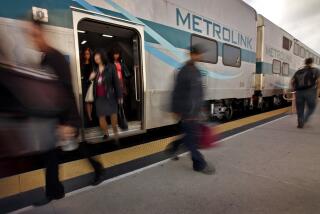No Mechanical Flaw Found at Site of Fatal Train Crash
- Share via
CORONA — Investigators have found no evidence of mechanical malfunctions preceding the collision of freight trains this week that killed four and injured two others, railroad and federal officials said Friday.
Tests of the locomotives, the rail tracks and the elevated signals that warn railway workers of oncoming trains have indicated that the equipment functioned properly--apparently raising the possibility that Wednesday’s crash was caused by human error.
“I’m sure it will help to narrow the possibilities” of what caused the accident, said M.E. Curtis, an assistant superintendent for operations of the Atchison Topeka & Santa Fe Railway Co.
Another official involved with the investigation said that both trains involved in the crash were properly tested and serviced before they departed, one from Los Angeles, the other from Barstow. The crash occurred at 4:10 a.m. on Wednesday when the westbound train failed to stop on a sidetrack and crashed into the path of the eastbound freight.
“We found no problems with the braking equipment. . . . We know that the (signal) directions were working properly. . . . Everything was properly tested,” said the official, who spoke on condition of anonymity.
The official also said that an encased cassette tape, called an event recorder, was found unscathed on the No. 5 locomotive of the westbound train. The tape has been flown to Washington, where it may show, among other things, how and when the train’s brakes were applied, according to the official.
At the crash site, workers on Friday were clearing the last of the twisted and charred debris. Officials said that Santa Fe resumed limited freight traffic through the Corona area, 50 miles east of downtown Los Angeles, early Friday morning. Barring any glitches, Santa Fe expects to have its usual number of freights and passenger lines using the tracks by today.
Also on Friday, hospital officials upgraded the conditions of the two crewmen who survived the crash. James Dawson, engineer of the eastbound freight, was listed in stable condition. Warren Sanders, the conductor on the same freight, was listed in good condition.
Killed were Virginia C. Hartzell, 29, of Baldwin Park; Gary R. Ledoux, 35, of Highland, Calif.; James S. Wakefield, 55, of Fontana; and Ronald E. Westervelt, 51, of San Bernardino.
VICTIMS OF CORONA TRAIN COLLISION Virginia C. Hartzell, 29, of Baldwin Park was on the last leg of her first solo trip as a brake operator on the Los Angeles-bound train. She was in charge of operating manual switches along the route and monitoring the placement of cars and locomotives. She had completed a three-week training course for the job on Oct. 29. Before that, she worked for Santa Fe as a dispatcher after serving nine years as a dispatching clerk. Services are pending.
Gary R. Ledoux, 35, of Highland, Calif., was the engineer of the Los Angeles-bound train. He had been a locomotive engineer for 17 years and was a member of the Brotherhood of Locomotive Engineers. He was born in Greenville, S.C., but moved to San Bernardino County 20 years ago. He was the father of two sons and a daughter and was the coach of a Little League team. He is also survived by his wife, Teri; his mother; a brother, and four sisters. Services will be at 11 a.m. Tuesday at Bobbit Memorial Chapel, 1299 E. Highland Ave., San Bernardino.
James S. Wakefield, 55, of Fontana was the conductor on the Los Angeles-bound train. He moved to San Bernardino County 35 years ago, when he started working as a conductor for Santa Fe. He was born in Broken Bow, Okla. He is survived by his wife, Lucille, two sons, a brother and five sisters. Services will be at noon Monday at Green Acres Memorial Park and Mortuary, 11715 Cedar Ave., Bloomington, Calif.
Ronald E. Westervelt, 51, of San Bernardino was the brake operator on the Chicago-bound train. He had worked for Santa Fe for 32 years as a brakeman and conductor. “He was a very dedicated worker,” said his daughter, Terri Rehlwaldt of Spokane, Wash. “He did the best job at Santa Fe. He was always safe. He was always very, very safe.” Westervelt, who was born and raised in San Bernardino, had come back from a fishing trip with his wife, Wilma, just last week. Other survivors include two grandchildren, his sister and mother. Services are pending.
More to Read
Sign up for Essential California
The most important California stories and recommendations in your inbox every morning.
You may occasionally receive promotional content from the Los Angeles Times.














